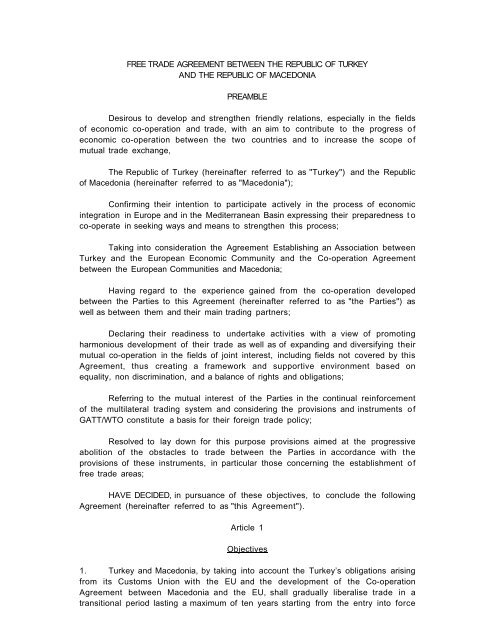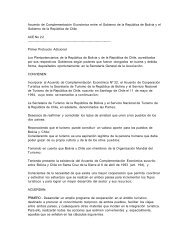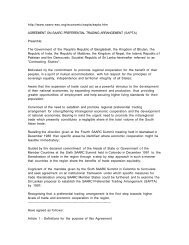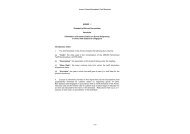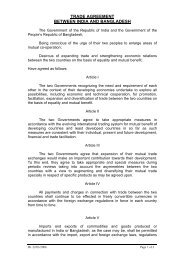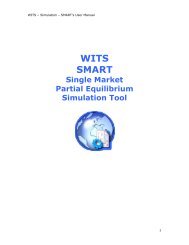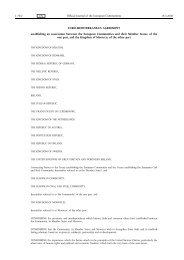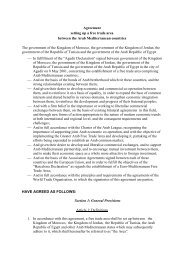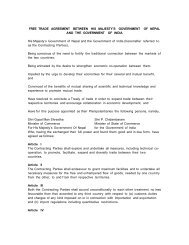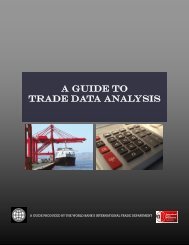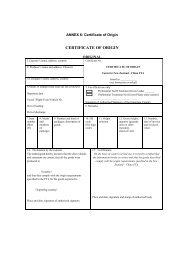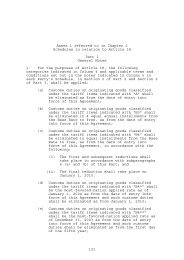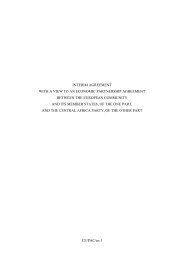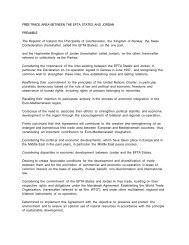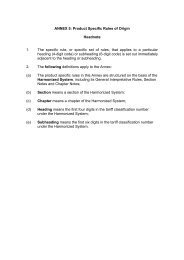FREE TRADE AGREEMENT BETWEEN THE REPUBLIC OF ... - WITS
FREE TRADE AGREEMENT BETWEEN THE REPUBLIC OF ... - WITS
FREE TRADE AGREEMENT BETWEEN THE REPUBLIC OF ... - WITS
Create successful ePaper yourself
Turn your PDF publications into a flip-book with our unique Google optimized e-Paper software.
<strong>FREE</strong> <strong>TRADE</strong> <strong>AGREEMENT</strong> <strong>BETWEEN</strong> <strong>THE</strong> <strong>REPUBLIC</strong> <strong>OF</strong> TURKEYAND <strong>THE</strong> <strong>REPUBLIC</strong> <strong>OF</strong> MACEDONIAPREAMBLEDesirous to develop and strengthen friendly relations, especially in the fieldsof economic co-operation and trade, with an aim to contribute to the progress ofeconomic co-operation between the two countries and to increase the scope ofmutual trade exchange,The Republic of Turkey (hereinafter referred to as "Turkey") and the Republicof Macedonia (hereinafter referred to as "Macedonia");Confirming their intention to participate actively in the process of economicintegration in Europe and in the Mediterranean Basin expressing their preparedness t oco-operate in seeking ways and means to strengthen this process;Taking into consideration the Agreement Establishing an Association betweenTurkey and the European Economic Community and the Co-operation Agreementbetween the European Communities and Macedonia;Having regard to the experience gained from the co-operation developedbetween the Parties to this Agreement (hereinafter referred to as "the Parties") aswell as between them and their main trading partners;Declaring their readiness to undertake activities with a view of promotingharmonious development of their trade as well as of expanding and diversifying theirmutual co-operation in the fields of joint interest, including fields not covered by thisAgreement, thus creating a framework and supportive environment based onequality, non discrimination, and a balance of rights and obligations;Referring to the mutual interest of the Parties in the continual reinforcementof the multilateral trading system and considering the provisions and instruments ofGATT/WTO constitute a basis for their foreign trade policy;Resolved to lay down for this purpose provisions aimed at the progressiveabolition of the obstacles to trade between the Parties in accordance with theprovisions of these instruments, in particular those concerning the establishment offree trade areas;HAVE DECIDED, in pursuance of these objectives, to conclude the followingAgreement (hereinafter referred to as "this Agreement").Article 1Objectives1. Turkey and Macedonia, by taking into account the Turkey’s obligations arisingfrom its Customs Union with the EU and the development of the Co-operationAgreement between Macedonia and the EU, shall gradually liberalise trade in atransitional period lasting a maximum of ten years starting from the entry into force
of this Agreement in accordance with the provisions of this Agreement and inconformity with those of the GATT 1994 and the other multilateral agreements ontrade in goods annexed to the Agreement Establishing the WTO.2. The objectives of this Agreement are:(a)(b)(c)(d)(e)(f)(g)(h)to increase the economic cooperation and raise the living standard ofthe population of the two countries;to gradually eliminate difficulties and restrictions on trade in goods,including also the agricultural products;to promote, through the expansion of reciprocal trade, the harmoniousdevelopment of the economic relations between the Parties;to provide fair conditions of competition for trade between theParties;to contribute in this way, by removal of barriers to trade, to theharmonious development and expansion of world trade;to enhance cooperation between the Parties;to create conditions for further encouragement of investmentsparticularly for the development of joint investments in bothcountries;to promote trade and cooperation between the Parties in thirdcountry markets.Article 2Basic Duties1. For commercial exchanges covered by this Agreement, the Customs Tariffs ofthe Parties shall be applied to the classification of goods for imports into them.2. For each product the basic duty to which successive reductions set out in thisAgreement are to be applied shall be the MFN duty that was in force in the Parties onthe date of entry into force of this Agreement.3. If after entry into force of this Agreement, any tariff reduction is applied onan erga omnes basis, in particular, reductions resulting from the tariff agreementconcluded as a result of the GATT Uruguay Round or accession of Macedonia to theWTO and Turkey-EC Customs Union or reductions applied by Macedonia to theproducts originating in the EC, such reduced duties shall replace the basic dutiesreferred to in paragraph 2 as from that date when such reductions are applied.4. The Parties shall mutually exchange their basic duties.CHAPTER I
Industrial ProductsArticle 3ScopeThe provisions of this Chapter shall apply to products falling within Chapters25 to 97 of Harmonized Commodity Description and Coding System with theexception of the products listed in Annex I.Article 4Customs Duties on Imports and Charges having Equivalent Effect1. No new customs duty on imports or charge having equivalent effect shall beintroduced in trade between the Parties from the date of entry into force of thisAgreement.2. Customs duties on imports applicable in Macedonia to products originating inTurkey shall be abolished in accordance with Annex II to this Agreement.3. Subject to special provisions laid down in Annex III to this Agreement,products originating in Macedonia shall be imported in Turkey free of customs dutiesor charges having equivalent effect.4. Any changes in Turkish and Macedonian commitments to the EuropeanCommunities in this regard shall be referred to the Joint Committee.Article 5Customs Duties of a Fiscal NatureThe provisions of Article 4 shall also apply to customs duties of a fiscalnature, except the charge for the customs record keeping applied by Macedonia.Article 6Customs Duties on Exports and Charges having Equivalent Effect1. No new customs duty on exports or charge having equivalent effect shall beintroduced in trade between the Parties.2. All customs duties on exports and any charges having equivalent effect shallbe abolished between the Parties upon entry into force of this Agreement.Article 7Quantitative Restrictions on Imports and Measures having Equivalent Effect
1. No new quantitative restriction on imports or measure having equivalenteffect shall be introduced nor shall those existing be made more restrictive in tradebetween the Parties from the date of entry into force of this Agreement.2. All quantitative restrictions on imports and measures having equivalent effectshall be abolished between the Parties upon the date of entry into force of thisAgreement with the exception of textile products which are covered by theMemorandum of Understanding between the Government of Macedonia and theGovernment of Turkey signed on 27 October 1997.Article 8Quantitative Restrictions on Exports and Measures having Equivalent Effect1. No new quantitative restriction on exports or measure having equivalenteffect shall be introduced nor shall those existing be made more restrictive in tradebetween the Parties from the date of entry into force of this Agreement.2. All quantitative restrictions on exports and any measures having equivalenteffect shall be abolished between the Parties upon the date of entry into force ofthis Agreement.Article 9Technical Regulations1. The rights and obligations of the Parties relating to standards or technicalregulations and related measures shall be governed by the WTO Agreement onTechnical Barriers to Trade.2. Each Party, upon request of the other Party, shall provide information onparticular individual cases of standards, technical regulations and related measures.3. The Parties shall aim to reduce technical barriers to trade. To this end theParties will enter where appropriate into negotiations for the conclusion of theagreements for the mutual recognition in the field of conformity assessment, in thespirit of the recommendations of the WTO Agreement on Technical Barriers to Trade.CHAPTER IIAgricultural, Processed Agricultural and Fish ProductsArticle 1 0Scope1. The provisions of this Chapter shall apply to agricultural, processedagricultural and fish products originating in the Parties.
2. The term "agricultural products" means for the purpose of this Agreementthe products falling within Chapters 1 to 24 of the Harmonized CommodityDescription and Coding System and the products listed in Annex I.Article 1 1Exchange of Concessions1. The Parties to this Agreement shall mutually allocate concessions set forth inProtocol 1 in accordance with the provisions of this Chapter.2. Taking into account the role of agriculture in their respective economies; thedevelopment of trade in agricultural products between the Parties; the highsensitivity of agricultural products; the rules of their respective agricultural policy,the Parties shall examine in the Joint Committee the possibilities for mutual allocationof future concessions.3. In pursuance of this objective, Protocol 1 providing for measures to facilitatetrade in agricultural products has been concluded between the Parties.Article 1 2Sanitary and Phytosanitary MeasuresThe Parties shall not apply their regulations in sanitary and phytosanitarymatters as an arbitrary or unjustifiable discrimination or a disguised restriction ontrade between them. The Parties shall apply their sanitary measures within the spiritof the provisions of the GATT and the other relevant WTO agreements.CHAPTER IIIRight of Establishment and Supply of ServicesArticle 1 31. The Parties to this Agreement recognize the growing importance of certainareas, such as services and investments. In their efforts to gradually develop andbroaden their co-operation, in particular in the context of the European integration,they will co-operate with the aim of achieving a progressive liberalization and mutualopening of their markets for investments and trade in services, taking into accountrelevant provisions of the General Agreement on Trade and Services.2. The Parties will discuss in the Joint Committee this cooperation with the aimof developing and deepening of their relations governed in this Article.
CHAPTER IVCommon ProvisionsArticle 1 4Internal Taxation1. The Parties to this Agreement shall refrain from any measure or practice of aninternal fiscal nature establishing, whether directly or indirectly, discriminationbetween the products of one Party and like products originating in the other Party.2. Products exported to one of the Parties may not benefit from repayment ofinternal taxes in excess of the amount of direct or indirect taxes imposed on them.Article 1 5Trade Relations Governed by Other Agreements1. This Agreement shall not prevent the maintenance or establishment ofcustoms unions, free trade areas or arrangements for cross-border trade of theParties with third countries to the extent that these do not negatively affect thetrade regime and in particular the provisions concerning rules of origin provided forby this Agreement.2. Exchange of information shall take place, upon request of either Party, withinthe Joint Committee concerning agreements establishing such customs unions orfree trade areas.Article 1 6Structural Adjustment1. Exceptional measures of limited duration which derogate from the provisionsof Article 4 may be taken by the Parties in the form of increased customs duties.2. These measures may only concern infant industries, or certain sectorsundergoing restructuring or facing serious difficulties, particularly where thesedifficulties produce important social problems.3. Customs duties on imports applicable in the Parties to products originating inthe other Party introduced by these measures may not exceed 25 per cent advalorem and shall maintain an element of preference for products originating in theother Party. The total value of imports of the products which are subject to thesemeasures may not exceed 15 per cent of total imports of industrial products fromthe other Party as defined in Article 4, during the last year for which statistics areavailable.4. These measures shall be applied for a period not exceeding five years unless alonger duration is authorized by the Joint Committee. They shall cease to apply atthe latest on the expiry of the transitional period.
5. No such measures can be introduced in respect of a product if more thanthree years have elapsed since the elimination of all duties and quantitativerestrictions or charges or measures having an equivalent effect concerning thatproduct.6. The Parties shall inform the Joint Committee of any exceptional measuresthey intend to take and, at the request of either Party, consultations shall be held inthe Joint Committee on such measures and the sectors to which they apply beforethey are applied. When taking such measures the Parties shall provide the JointCommittee with a schedule for the elimination of the customs duties introducedunder this Article. This schedule shall provide for a phasing out of these dutiesstarting at the latest two years after their introduction, at equal rates. The JointCommittee may decide on a different schedule.Article 1 7DumpingIf a Party finds that dumping, within the meaning of Article VI of GeneralAgreement on Tariffs and Trade is taking place in trade relations governed by thisAgreement, it may take appropriate measures against that practice in accordancewith Article VI of the GATT and the rules established by agreements related to thatArticle, under the conditions and in accordance with the procedures laid down inArticle 21 of this Agreement.Article 1 8Emergency Action on Imports of Particular ProductsWhere any product is being imported into either of the Parties in suchincreased quantities and under such conditions as to cause, or threaten to cause:(a)(b)serious injury to domestic producers or disturbances on the market oflike or directly competitive products;serious disturbances in any sector of the economy or difficulties whichcould bring about serious deterioration in the economic situation of aregion,the Party concerned may take appropriate measures under the conditions and inaccordance with the procedures laid down in Article 21.Article 1 9Re-export and Serious ShortageWhere compliance with the provisions of Articles 6 and 8 leads to:(a)re-export towards a third country against which the exporting Party t othis Agreement maintains for the product concerned quantitative
export restrictions, export duties or measures or charges havingequivalent effect; or(b) a serious shortage, or threat thereof, of a product essential to theexporting Party;and where the situations referred to above give rise or are likely to give rise to majordifficulties for the exporting Party, that Party may take appropriate measures underthe conditions and in accordance with the procedures laid down in Article 21 of thisAgreement. The measures shall be non-discriminatory and be eliminated whenconditions no longer justify their maintenance.Article 2 0State Monopolies1. The Parties shall progressively adjust any state monopoly of a commercialcharacter so as to ensure that by the end of the year following the entry into forceof this Agreement, no discrimination regarding the conditions under which goods areprocured and marketed will exist between nationals of the Parties.2. The Joint Committee shall be informed about the measures adopted t oimplement this objective.Article 2 1Procedure for The Application of Safeguard Measures1. Before initiating the procedure for the application of safeguard measures setout in this Article, the Parties shall endeavour to solve any differences betweenthemselves through direct consultations, and shall inform the other Party thereof.2. In the cases specified in Articles 17, 18, 19, 24 and 32 a Party which isconsidering to resort to safeguard measures shall promptly notify the JointCommittee thereof. The Party concerned shall provide the Joint Committee with allrelevant information and give it the assistance required to examine the case.Consultations between the Parties shall take place without delay in the JointCommittee with a view to finding a commonly acceptable solution.3. If, within one month of the matter being referred to the Joint Committee, theParty in question fails to put an end to the practice objected to or to the difficultiesnotified and in the absence of a decision by the Joint Committee in the matter, theconcerned Party may adopt the safeguard measures it considers necessary t oremedy the situation.4. The safeguard measures taken shall be notified immediately to the JointCommittee. They shall be restricted, with regard to their extent and to theirduration, to what is strictly necessary in order to rectify the situation giving rise t otheir application and shall not be in excess of the damage caused by the practice orthe difficulty in question. Priority shall be given to such measures that will leastdisturb the functioning of this Agreement.
5. The safeguard measures taken shall be the subject of regular consultationswithin the Joint Committee with a view to their relaxation, or abolition whenconditions no longer justify their maintenance.6. Where exceptional circumstances requiring immediate action make priorexamination impossible, the Party concerned may, in the cases of Articles 17, 18,19, 24 and 32, apply forthwith the precautionary measures strictly necessary t oremedy the situation. The measures shall be notified without delay to the JointCommittee and consultations between the Parties to this Agreement shall take placewithin the Joint Committee.Article 2 2Rules of Origin and Cooperation between the Customs AdministrationsProtocol 2 lays down the rules of origin and methods of administrativecooperation.Article 2 3PaymentsAny settlement and payment arising from trade of goods, services and rightsto non material goods between both states shall be made in convertible currency, inaccordance with the respective legislation of the Parties.Article 2 4Rules of Competition Concerning Undertakings, State Aid1. The following are incompatible with the proper functioning of this Agreement,in so far as they affect trade between the Parties:(a)(b)(c)all agreements between undertakings, decisions by associations ofundertakings and concerted practices between undertakings whichhave as their object or effect the prevention, restriction or distortionof competition;abuse by one or more undertakings of dominant position in theterritories of the Parties as a whole or in a substantial part thereof;any state aid which distorts or threatens to distort competition byfavoring certain undertakings or the production of certain goods.2. Each Party shall ensure transparency in the area of state aid. Upon reques tby one Party, the other Party shall provide information on particular individual casesof state aid.3. For the purpose of applying the provisions of paragraph 1 of this Article, theParties will take the measures in conformity with the procedures and under the
conditions laid down in their respective Agreements with the European Communities.In case of any change in those procedures and/or conditions these changes will beapplicable between the Parties.4. If the Parties consider that a particular practice is incompatible with the termsof the first paragraph of this Article, and:(a)(b)is not adequately dealt with under the implementing rules referred t oin paragraph 3 of this Article, or;in the absence of such rules, and if such practice causes or threatensto cause serious prejudice to the interest of the other Party ormaterial injury to its domestic industry, including its services industry,it may take appropriate measures after consultation within the Joint Committee orafter thirty working days following referral for such consultation.5. In the case of practices incompatible with paragraph 1(c) of this Article, suchappropriate measures may, where the WTO/GATT 1994 applies thereto, only beadopted in conformity with the procedures and under the conditions laid down by theWTO/GATT 1994 and any other relevant instrument negotiated under its auspiceswhich are applicable between the Parties.6. Notwithstanding any provisions to the contrary adopted in conformity withparagraph 3 of this Article, the Parties shall exchange information taking into accountthe limitations imposed by the requirements of professional and business secrecy.Article 2 5Balance of Payments DifficultiesWhere either Party is in a serious balance of payments difficulties or underthreat thereof, the Party concerned may in accordance with the conditions laid downwithin the framework of WTO/GATT 1994 and with Article VIII of the Articles ofAgreement of International Monetary Fund, adopt restrictive measures, which shall beof limited duration and may not go beyond what is necessary to remedy the balanceof payments situation. The Party concerned shall inform the other Party forthwith oftheir introduction and present to the other Party, as soon as possible, of a timeschedule of their removal.Article 2 6Intellectual, Industrial and Commercial Property1. The Parties shall provide suitable and effective protection of intellectual,industrial and commercial property rights in line with the highest internationalstandards. This shall encompass effective means of enforcing such rights.2. Implementation of this Article shall be regularly assessed by the Parties. Ifdifficulties which affect trade arise in connection with intellectual, industrial and
commercial property rights, either Party may request urgent consultations to findmutually satisfactory solutions.Article 2 7Public Procurement1. The Parties consider the opening up of the award of public contracts on thebasis of non-discrimination and reciprocity, to be a desirable objective.2. As of the entry into force of this Agreement, both Parties shall grant eachother’s companies access to contract award procedures a treatment no lessfavorable than that accorded to companies of any other country.Article 2 8Establishment of the Joint Committee1. A Joint Committee is hereby established in which each Party shall berepresented. The Joint Committee shall be responsible for the administration of thisAgreement and shall ensure its proper implementation.2. For the purpose of the proper implementation of this Agreement, the Partiesshall exchange information and, at the request of either Party, shall holdconsultations within the Joint Committee. The Joint Committee shall keep underreview the possibility of further removal of the obstacles to trade between theParties.3. The Joint Committee may, in accordance with the provisions of paragraph 3of Article 29, take decisions in the cases provided for in this Agreement. On othermatters the Joint Committee may make recommendations.Article 2 9Procedures of the Joint Committee1. For the proper implementation of this Agreement, the Joint Committee shallmeet at an appropriate level whenever necessary upon request but at least once ayear. Either Party may request a meeting be held.2. The Joint Committee shall act by common agreement.3. If a representative in the Joint Committee of a Party to this Agreement hasaccepted a decision subject to the fulfilment of constitutional requirements thedecision shall enter into force, if no later date is contained therein, on the day thelifting of the reservation is notified.4. The Joint Committee shall adopt its rules of procedure which shall, inter alia,contain provisions for convening meetings and for the designation of the Chairmanand his/her term of office.
5. The Joint Committee may decide to set up such sub-committees and workingparties as it considers necessary to assist it in accomplishing its tasks.Article 3 0Security ExceptionsNothing in this Agreement shall prevent a Party from taking any measureswhich it considers necessary:(a) to prevent the disclosure of information contrary to its essentialsecurity interests;(b)for the protection of its essential security interests or for theimplementation of international obligations or national policies:(i)(ii)relating to the traffic in arms, ammunition and implements ofwar and to such traffic in other goods, materials and servicesas is carried on directly or indirectly for the purpose ofsupplying a military establishment; orrelating to the non-proliferation of biological and chemicalweapons, nuclear weapons or other nuclear explosive devices;or(iii) in time of war or other serious international tensionconstituting threat of war.Article 3 1General ExceptionsThis Agreement shall not preclude prohibitions or restrictions on imports,exports or goods in transit justified on grounds of public morality, public policy orpublic security; the protection of health and life of humans, animals or plants; theprotection of national treasures possessing artistic, historic or archaeological value;the protection of intellectual, industrial and commercial property. Such prohibitionsor restrictions must not, however, constitute a means of arbitrary discrimination or adisguised restriction on trade between the Parties.Article 3 2Fulfilment of Obligations1. The Parties shall take all necessary measures to ensure the achievement ofthe objectives of this Agreement and the fulfilment of their obligations under thisAgreement.2. If either Party considers that the other Party has failed to fulfill an obligationunder this Agreement, the Party concerned may take the appropriate measures
under the conditions and in accordance with the procedures laid down in Article 21 ofthis Agreement.Article 3 3Evolutionary Clause1. Where either Party considers that it would be useful in the interest of theeconomies of the Parties to develop the relations established by this Agreement byextending them to fields not covered thereby, it shall submit a reasoned request t othe other Party. The Parties may instruct the Joint Committee to examine thisrequest and, where appropriate, to make recommendations to them, particularly witha view to opening negotiations.2. Agreements resulting from the procedure referred to in paragraph 1 will besubject to ratification or approval by the Parties to this Agreement in accordancewith their internal legal procedures.Article 3 4AmendmentsAmendments to this Agreement, including to its Annexes and Protocols, shallenter into force on the date of receipt of the last notification, via diplomaticchannels, confirming that all internal legal procedures required by either Party fortheir entry into force have been concluded.Article 3 5Protocols and AnnexesProtocols and Annexes and Record of Understanding 1 and 2 to thisAgreement shall form an integral part thereof. The Joint Committee may decide t oamend the Protocols and Annexes in accordance with the internal legislation of theParties.Article 3 6Validity and Termination1. This Agreement is concluded for an unlimited period.2. Each party may denounce this Agreement by means of a written notificationto the other Party. This Agreement shall cease to apply after six months from thedate of receipt of the written notification by the other Party.Article 3 7Entry into Force
This Agreement shall enter into force on the first day of the second month,from the last notification, via diplomatic channels between the Parties, on entry intoforce of this Agreement in accordance with the internal legislation of the Parties.DONE at Ankara, this 7 th day of September 1999, in duplicate copies, in theMacedonian, Turkish and English languages, all texts being equally authentic. In caseof any divergence in the interpretation of this Agreement, the English text shallprevail.For the Republic of Turkey For the Republic ofMacedonia
RECORD <strong>OF</strong> UNDERSTANDING- INotwithstanding the Articles 7 and 8 of this Agreement, Turkey andMacedonia, by taking into account the state of a transitional economy in Macedonia,have agreed that Macedonia may continue to implement the existing protectivemeasures on exports and imports in a period foreseen by Macedonia.RECORD <strong>OF</strong> UNDERSTANDING- IITrade in textile products falling within Chapters 50 to 63 of the HarmonizedCommodity and Coding System between Turkey and Macedonia shall continue to beregulated by the Memorandum of Understanding between the Government of Turkeyand the Government of Macedonia concerning trade in textiles and clothing productssigned on 27 October 1997.This Memorandum of Understanding will become null and void when theEuropean Union abolishes the arrangements on trade in textile products withMacedonia.


